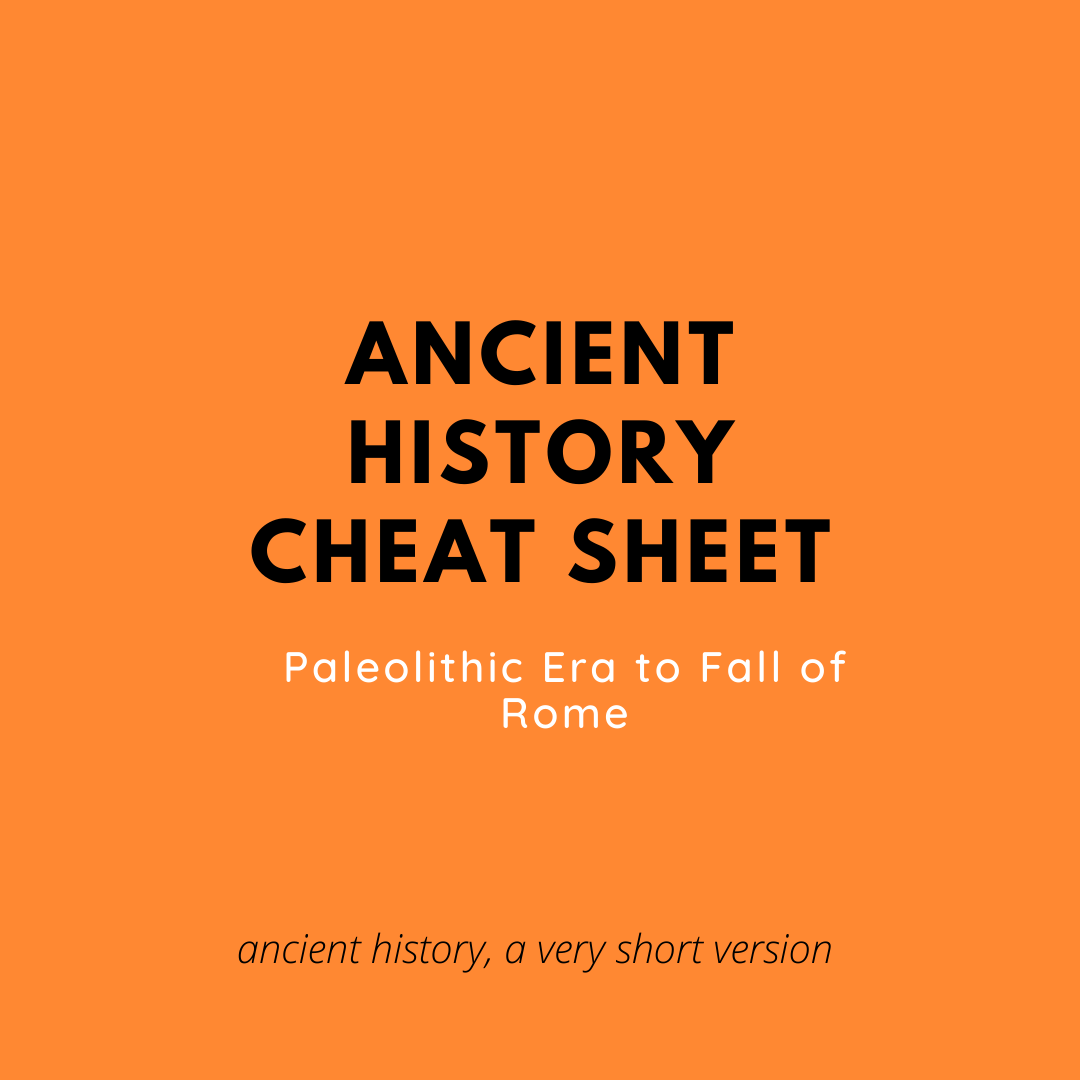Ancient History : Cheat Sheet.
Paleolithic era.
First there were no humans. Then there were. That was a long time ago. No one could read or write. But they figured out other stuff, like fire and hunting. Then the Ice Age came and people migrated to warmer places.
Neolithic era.
They learn how to plant food, which means less hunting and less migrating, which means more permanent homes, which means civilizations develop and people have time to invent new things, like the wheel and art.
Civilizations in the Middle East.
The first organized societies began developing in an area of the Middle East known as the Fertile Crescent. Then known as Mesopotamia, now known as Iraq. Other civilizations also develop in Pakistan (Indus River Valley), China, and later, the Americas. Who was first? Who knows.
More stuff is invented, like reading and writing, sails, innovative irrigation methods, things like that. The writing part is important because finally we have written evidence to learn from thousands of years later. Empires are formed, including the Assyrians, Babylonians, and Sumerians.
Africa.
Egypt is the largest, longest-lasting, and probably most well-known today of ancient African civilizations. They were super good at developing calendars and building triangular structures and such. But there were other notable African powers as well, including the kingdoms of Kush (Sudan) and Carthage.
Phoenicians and Israelites.
Phoenicians, in the Mediterranean, do two important things: they develop a spelled-out alphabet (as opposed to using pictures), and they do a lot of trading by ship. That means their ideas - and alphabet - get spread all over, and eventually influences the Greeks, and in turn, Romans.
Israelites develop ideas about monotheism (one God) and ways of living that massively influence where religion goes later on (that includes you, Christianity and Islam).
India and China.
(coming soon)
Greece.
Oh, what debt does the Western hemisphere not owe to ancient Greece? At its peak between 500-300 BC, Greece was not so much a country as a collection of city-states that sort of got along, at least when there were bigger enemies to ally against. These various city-states, led by Athens, developed ideas about democracy, government, culture, art, and…pretty much everything that still influences us today. Eventually Alexander the Great conquered them, and then Rome, but so many other countries adopted ideas from them that their influence is soaked into almost every aspect of day-to-day lives in the western world.
Rome the Republic.
Rome was founded in 700 BC and became a republic, where representatives of the people could vote. It was a big step and a big deal and took the ideas of democracy and written laws even further. A big difference between them and the Greeks before them was that they wanted to expand. They were unified enough to conquer other peoples and lands and keep adding to their dominion. They took down other countries and empires, most notably led by Julius Caesar.
Rome the Empire.
Julius Caesar is assassinated. Killed by friends and colleagues because of concerns about his ambitions for power. His (adopted) nephew, Augustus Caesar, is super-smart and keeps his ambitions a little more quiet, but still manages to create a position where he can pretty much do whatever he wants, while still strictly avoiding the designation of “dictator.” He starts a bunch of good stuff for Rome, like massive building projects and education and such. These are golden years, known elegantly as pax Romana. During this time Jesus the Christ is born (and dies), kickstarting the growth of Christianity, which is eventually adopted as the state religion.
Fall of Rome.
A bunch of German and European tribes are constantly trying to take down Rome. Along the way, Rome splits into two main branches: the Western Roman Empire and the Eastern Roman Empire (the latter known as the Byzantine Empire). Eventually the Western Roman Empire is annihilated by the barbarian hordes. Historians refer to the year 476 AD as end of the Roman Empire. Sad.
That moves us to the next era of history: the Middle Ages.
